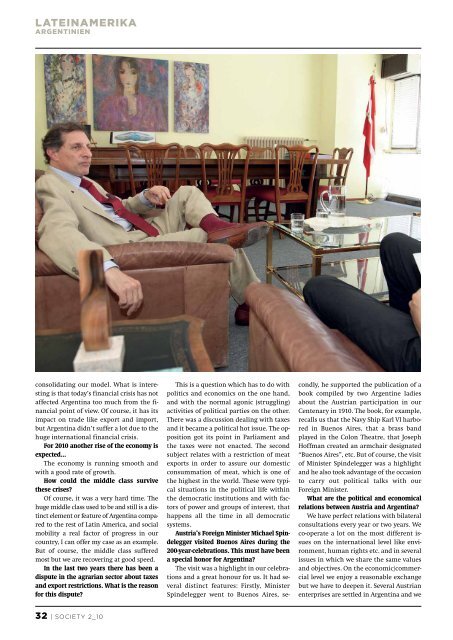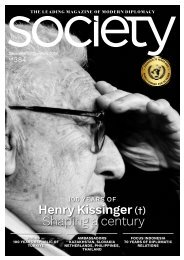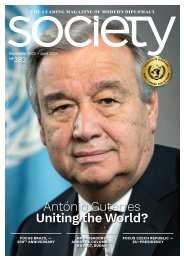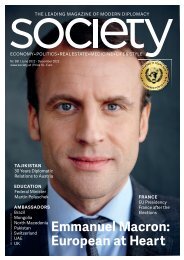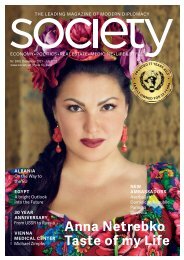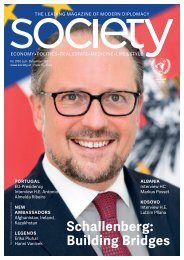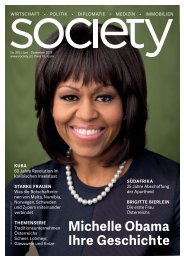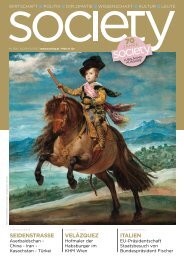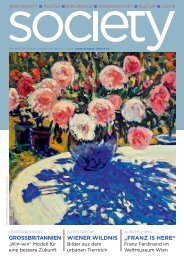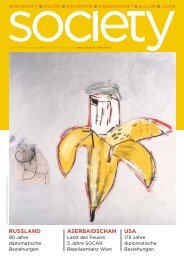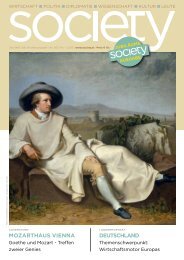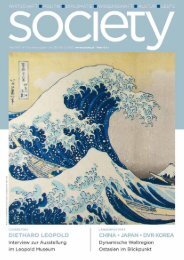SOCIETY 354 /2010
Erfolgreiche ePaper selbst erstellen
Machen Sie aus Ihren PDF Publikationen ein blätterbares Flipbook mit unserer einzigartigen Google optimierten e-Paper Software.
LATEINAMERIKA<br />
ARGENTINIEN<br />
consolidating our model. What is interesting<br />
is that today’s financial crisis has not<br />
affected Argentina too much from the financial<br />
point of view. Of course, it has its<br />
impact on trade like export and import,<br />
but Argentina didn’t suffer a lot due to the<br />
huge international financial crisis.<br />
For <strong>2010</strong> another rise of the economy is<br />
expected…<br />
The economy is running smooth and<br />
with a good rate of growth.<br />
How could the middle class survive<br />
these crises?<br />
Of course, it was a very hard time. The<br />
huge middle class used to be and still is a distinct<br />
element or feature of Argentina compared<br />
to the rest of Latin America, and social<br />
mobility a real factor of progress in our<br />
country, I can offer my case as an example.<br />
But of course, the middle class suffered<br />
most but we are recovering at good speed.<br />
In the last two years there has been a<br />
dispute in the agrarian sector about taxes<br />
and export restrictions. What is the reason<br />
for this dispute?<br />
This is a question which has to do with<br />
politics and economics on the one hand,<br />
and with the normal agonic (struggling)<br />
activities of political parties on the other.<br />
There was a discussion dealing with taxes<br />
and it became a political hot issue. The opposition<br />
got its point in Parliament and<br />
the taxes were not enacted. The second<br />
subject relates with a restriction of meat<br />
exports in order to assure our domestic<br />
consummation of meat, which is one of<br />
the highest in the world. These were typical<br />
situations in the political life within<br />
the democratic institutions and with factors<br />
of power and groups of interest, that<br />
happens all the time in all democratic<br />
systems.<br />
Austria’s Foreign Minister Michael Spindelegger<br />
visited Buenos Aires during the<br />
200-year-celebrations. This must have been<br />
a special honor for Argentina?<br />
The visit was a highlight in our celebrations<br />
and a great honour for us. It had several<br />
distinct features: Firstly, Minister<br />
Spindelegger went to Buenos Aires, secondly,<br />
he supported the publication of a<br />
book compiled by two Argentine ladies<br />
about the Austrian participation in our<br />
Centenary in 1910. The book, for example,<br />
recalls us that the Navy Ship Karl VI harbored<br />
in Buenos Aires, that a brass band<br />
played in the Colon Theatre, that Joseph<br />
Hoffman created an armchair designated<br />
“Buenos Aires”, etc. But of course, the visit<br />
of Minister Spindelegger was a highlight<br />
and he also took advantage of the occasion<br />
to carry out political talks with our<br />
Foreign Minister.<br />
What are the political and economical<br />
relations between Austria and Argentina?<br />
We have perfect relations with bilateral<br />
consultations every year or two years. We<br />
co-operate a lot on the most different issues<br />
on the international level like environment,<br />
human rights etc. and in several<br />
issues in which we share the same values<br />
and objectives. On the economic/commercial<br />
level we enjoy a reasonable exchange<br />
but we have to deepen it. Several Austrian<br />
enterprises are settled in Argentina and we<br />
32 | <strong>SOCIETY</strong> 2_10


